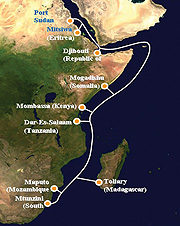Technicians and business developers from seven countries convened at Serena Hotel in Rubavu Wednesday to design and develop a time line for the $250 million (Frw135.9 billion) Eastern Africa Submarine Cable System (EASSy).


Technicians and business developers from seven countries convened at Serena Hotel in Rubavu Wednesday to design and develop a time line for the $250 million (Frw135.9 billion) Eastern Africa Submarine Cable System (EASSy).
The EASSy project is a 9,900 kilometre high-performance, under-sea fibre optic cable aimed at linking Eastern Africa to the world.
Discussions, which end today, are also aimed at developing a $20 million (Frw10.8 billion) backhaul system to help countries that subscribe to EASSy access the coastal optic fiber cable.
Participants also discussed the status and progress of the backhaul.
The EASSy cables together with the backhaul are fully integrated multi-technology networks that will support next generation networks.
Currently traffic and highly expensive Internet bandwidth between the region and the world is exchanged through satellite linkages. The cable is also expected to help cut the cost of communication in the region.
The meeting is one of a series that have been carried out to discuss the implementation of the submarine cable to connect east, central and southern African countries.
If the cable is connected throughout the region, the cost of communication will be very low, said Andrew Rugege, MTN Rwanda chief operations officer.
Operators will only be subscribing at $200 (Frw108,000) to $500 (Frw271,875) per month. Currently operators are paying more than $5,000 (Frw2.7 million).
"We also expect to offer better quality services if this project is realized,” Rugege said.
Telecom operators said they are optimistic that, by June 2010, users will be able to benefit from the project.
Even if the East African region is not connected to the submarine cable, the backhaul can be used to transfer all the traffic without using the satellite which is expensive to both operators and end users.
Rugege said Rwanda will be fully connected by the end of 2009.
Representatives from Rwanda, Uganda, Kenya, Burund, Tanzania, Zambia and Botswana attended the meeting.
Ends


